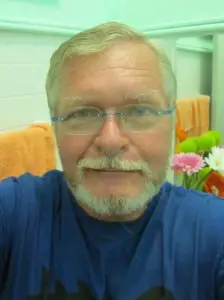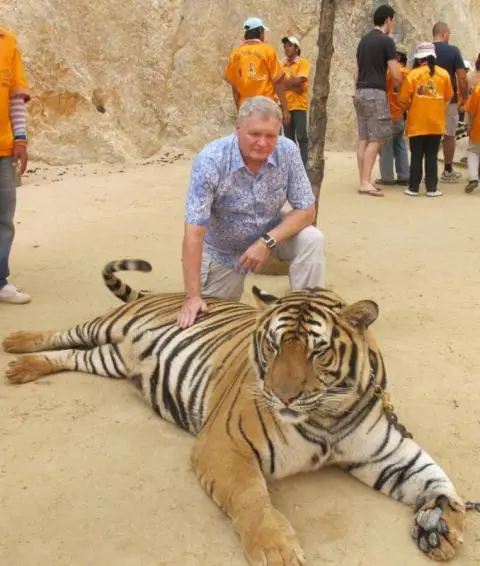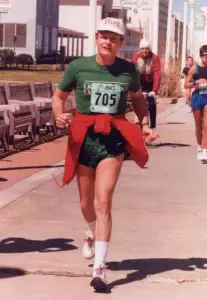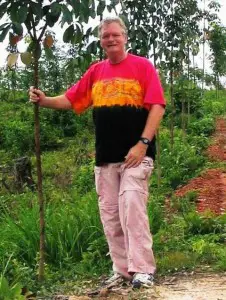 Larry Welch is an American writer, author of three books of nonfiction, who has been living in Thailand since 2007. He was born in 1942 in Michigan, and now resides at Pathumthani where he has just finished two years of teaching English at Suankularb Wittayalai Rangsit School. An entrepreneur, he operates the Full Moon Rubber Plantation at Nakhon Phanom with a Thai business partner. In this interview he talks about his books, Thailand, travels, positive thinking and his passion for running.
Larry Welch is an American writer, author of three books of nonfiction, who has been living in Thailand since 2007. He was born in 1942 in Michigan, and now resides at Pathumthani where he has just finished two years of teaching English at Suankularb Wittayalai Rangsit School. An entrepreneur, he operates the Full Moon Rubber Plantation at Nakhon Phanom with a Thai business partner. In this interview he talks about his books, Thailand, travels, positive thinking and his passion for running.
Voicu Mihnea Simandan: In 2009, you published The Human Spirit – Stories from the Heart, a book put together from the stories you published in an online newsletter between 1998 and 2003. What are you writing at the moment?
Larry Welch: I just completed a new book of travel stories called, A Happy Journey, Stories from the Heart, which should be published in fall, 2010; and I expect to soon start another book tentatively titled, School Days in Thailand, which is a memoir of my life as an English teacher.
VMS: What is the current newsletter about?
LW: It’s about a recent trip I took to Vientiane, Laos. It tells a little about the interesting culture, history, and people of Vientiane with photographs of prominent landmarks. The August issue will feature Rangoon, Burma.
VMS: How can people subscribe to your newsletter?
LW: I send it freely and all anyone has to do is let me know they’d like to receive it. Probably the best way is to write me at lnwelch[at]aol.com.
VMS: You have been living in Thailand for three years now, but previously you travelled to many countries around the world. What’s so special about Thailand? Why did you choose Thailand as the country of your retirement?
LW: Thailand is special to me because I have the rubber plantation, so it is a country where I do business, but beyond that the weather, food, high quality of the people, the calming nature of Buddhism, and interesting culture have kept my interest. It is also an excellent base for travel to other countries in Southeast Asia so it is something of a 3D experience and with opportunities galore to learn and grow about this part of the world.
VMS: Tell us about your job as a teacher at Suankularb Wittayalai Rangsit School in Pathumthani.
LW: The association with Thai teenagers was one of the most extraordinary good experiences of my life. In the two years I taught over a thousand kids in English; it amounted to about 600 students a week in 24 classes. We hear that teachers learn more from students that what they deliver and that was certainly the case with me. I was lucky enough to tune into Thailand’s youth culture and as a result learn so much more about the country. I had a warm association with not only the kids, but also parents and Thai teachers. It was hard work, but highly rewarding.
VMS: You have competed 39 marathons and are still running. What are your experiences as a runner in Thailand.
LW: I haven’t yet aligned myself with a running club or joined in the road races in Thailand, but continue to jog 5-15 kilometers a day. The Big Sun gives me a baking and that is balanced by tropical showers. I’ve run many times on jungle paths near my rubber plantation at Nakhon Phanom and beside Rangsit Klongs 3 and 4 near my home. Jogging is an inspiration to me wherever I am in the world. As my life as changed and I’ve moved around, running has been the one constant that has kept me grounded to the past, present and future. It’s the place where I think things through, let my mind wonder, and relax.
VMS: Reading all three of your books, I couldn’t help noticing their underlying theme: your encouragement for self-improvement and positive thinking. Please comment.
LW: As best I can explain, faith, hope and optimism are bedrock qualities in my makeup. I spent 18 years with Toastmasters International being trained and helping others in learning self-expression and critical thinking. The message that most naturally occurred to me in this experience was the practice and promotion of positive thinking and efforts to follow a path of self-improvement. Humans are pretty lazy, myself included. If we don’t make an effort to move forward in our lives we simply mellow into mental and physical slobs. Once you realize that, you truly want to find the energy to strive for something better in your life.
VMS: Since you’ve been in Thailand you’ve visited a few neighbouring countries. With what feelings did you come back from your travels in Southeast Asia?
LW: I’ve been to all 11 countries in Southeast Asia and the overarching theme is poverty. Once you internalize that situation you never think the same way about the world again. Before moving from the United States to Singapore in 2002, I was a compassionate activist with many nonprofit community groups; however, as a result of my travels the depth of my feelings for the diseased, hungry, and poor has intensified. Further, the corruption in most Southeast Asian countries is one of the root causes of poverty. People simply aren’t sharing equally in the wealth that most of these nations possess. As a result, the social infrastructure suffers horribly. And lastly, there is a severe lack of protection for the well being of women and children. Domestic violence is wide spread without proper community safeguards, and wives and children are left to fend for themselves after being deserted by errant husbands.
LW: In 2004, I was at Apia, Samoa, and visited Robert Louis Stevenson’s plantation where he spent the last five years of his life. It was such a beautiful place I was inspired to imagine I had a plantation and that’s where the seed of an idea started. In 2005 and 2006 I bought jungle land near Nakhon Phanom, cleared it and planted 18,000 samplings, which need to grow 6-7 years before they produce latex. Over the years I’ve used a high grade fertilizer every six months to nurture a strong growth and expect that they will be ready to produce rubber sometime in 2011. The plantation is in the care of my business partner who provides day-to-day management, hires workers, and coordinates work schedules. We also grow rice and cassava.
VMS: Tell us about your writing routine?
LW: In a day’s routine, I usually read for an hour and write for two hours. The writing time includes research. I am particularly careful with the accuracy of details so I spend a lot of time on the Internet and in reading background materials to validate my statements. My descriptions contain a considerable amount of information on culture, economics, history, and religion, that readers expect to be true to life. I don’t want to compromise that trust. Whether writing, speaking or teaching kids, people invest trust in the leaders they follow so I am extremely careful with research. Further to the writing process is the thinking component. When I wrote my first book, Mary Virginia, A Father’s Story, I wrote 500 words a day for 60 days. At the end I had 30,000 words and 130 pages, just enough for a nice little book. But I also took an hour or more of thinking time everyday to do mental composition. That way when I sat down at the keyboard I already had an idea of what those 500 words for the day would be. After writing a book, the real work begins. I do extensive editing and re-writing that can take longer than actually writing that first draft.
VMS: Thank you for your time and I’m looking forward to your new book and, of course, your newsletter.
LW: Well, it’s a great pleasure to speak with you about my favorite activities and especially living in Thailand. Wish you all the best and thanks for calling on me.
July 12, 2010
Voicu Mihnea Simandan
Bangkok, Thailand



